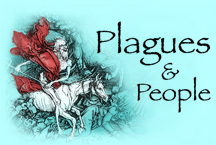I have been asked by some of my friends to write something about the
cause of this general pestilence, showing its natural cause, and why it
affected so many countries, and why it affected some countries more than
others, and why within those countries it affected some cities and towns
more than others, and why in one town it affected one street, and even
one house, more than another, and why it affected nobles and gentry less
than other people, and how long it will last. And they asked that
after explaining the cause I should discuss appropriate remedies, drawing
on my own opinions and medical advice....
... it has been, and is, known by all astrologers that in the year 1345
... there was a total eclipse of the moon, of long duration, on 18 March.
At the longitude of Oxford it began an hour after the moon rose, and at
the time the two planets [Jupiter and Saturn] were in conjunction in Aquarius,
and Mars was with them in the same sign, within the light of Jupiter.
The sun is the lord, the director of all events, both general and specific,
and the moon is second to him in dominion and power, and their effect is
to intensify the effects of the planets acting with them. It is therefore
in the natural course of events, and not to be wondered at, that such a
great configuration should bring about major events on the earth, from
the nature of the planets which drew to themselves the natures of the sun
and moon. For when the sun is directly opposite the moon, as occurs
in a total eclipse, then the power of each of them reaches the earth in
a straight line, and the mingling of the influence of sun and moon with
that of the superior planets creates a single celestial force which operates
in conformity with the nature of the superior planets, which have drawn
to themselves the powers of the sun and moon.... On their own they
cannot achieve anything great or universal, but when compounded with the
sun and moon ... they bend the nature of the two luminaries to their own
nature, and thus with the power of the two luminaries are able to achieve
great things which have a general and universal impact. These natural
causes affect the whole inhabited world between east and north....
-
Saturn ... governs the whole eastern part of the inhabited world;
-
Mars the whole western part; and
-
Jupiter ... rules the whole northern part.
Thus the greater part of the earth was influenced....
Not all ... were affected in the same way ... because ... the impact
of the heavens cannot affect them all equally for that action of which
I speak is natural and operates according to the rules of nature.
It cannot act in the same way in every case, but only has an effect insofar
as the ground has been prepared for it.
[N]obles and gentry were less affected than the rest of the population
[because] at the time of this eclipse the three superior planets were in
the sign of Aquarius, where the fixed stars are not of the first magnitude
and ... are lesser stars which signify the common people, and therefore
the effect of the illness which they brought touched those people more....
Because Saturn was dominant, he brings cold (greater than the sun could
counter) to each country under his rule, and because of the sign in which
the conjunction occurred men will experience the onset of lingering illnesses
such as consumption, catarrh, paralysis and gout; passions of the heart
arising from unhappiness; and the deaths of those who have endured long
weakness.... |

